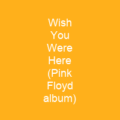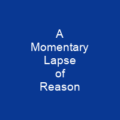The Final Cut is the twelfth studio album by English rock band Pink Floyd. It comprises unused material from the previous Pink Floyd record, The Wall, alongside new material recorded throughout 1982. Roger Waters planned the album as a soundtrack for the 1982 film adaptation of The Wall. With the onset of the Falklands War, he rewrote it as a concept album exploring what he considered the betrayal of his father, who died serving in the Second World War.
About The Final Cut (album) in brief

through Harvest and Columbia Records. It is also the onlyPink Floyd album not to feature keyboardist Richard Wright, who was sacked during the Wall sessions. The recording was plagued by conflict; guitarist David Gilmour felt many of the tracks were not worthy of inclusion, but Waters accused him of failing to contribute material himself. Five other tracks not used on The Wall had been set aside for Spare Bricks, and although Pink Floyd had often reused material, Gilmours felt the songs were not good enough for a new album. Waters said: I felt then, as now, that the British government should have pursued diplomatic avenues, rather than steaming in the moment that task force arrived in the South Atlantic. There are elements of all this stuff that, years later, you can look back on and say, \”Well, he had a point there. But he wasn’t right about wanting to put some duff tracks on The Final cut. I said to Roger, \”If these songs weren’t goodenough for The Wall,. why are they good enough now?\” ’’ “I’d seen all that chiselled away, and I’d seen a return to an almost Dickensian society under Margaret Thatcher’s .” “This post-war dream was that their victory would usher in a more peaceful world, whose leaders would no longer be so eager to resolve disputes by resorting to war’.
You want to know more about The Final Cut (album)?
This page is based on the article The Final Cut (album) published in Wikipedia (as of Dec. 05, 2020) and was automatically summarized using artificial intelligence.







